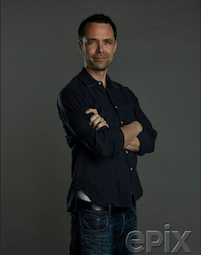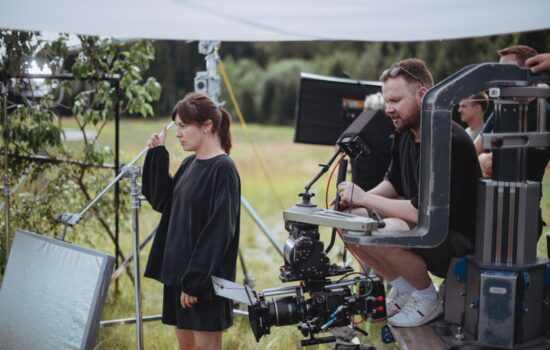Showrunner
Career Overview
Showrunners are in charge of the writing and execution of a television series. They run the Writers’ room, guide Directors and creative crew, and collaborate with the studio/network to deliver their unique vision of the show.
Alternate Titles
None
Avg. Salary
$100K to $300K an episode1
Salary Range
$30K an episode to $20M a year1

How To Become a Showrunner
People also ask
Career Description
Davey Holmes, Creator and Showrunner of Get Shorty on Epix, explains the breadth of his daily responsibilities: “Every day is different depending on the time of year. Before production starts, it’s a bit easier — I start the day a little later so I can get my own writing done, then go in and work with the Writers’ room, Script Analyst and Script Reader.
“We meet three times a week, so we have two days to do the actual writing. Around the writing, I’m crewing up, hiring people, and starting to do early casting. But largely, pre-production is all about breaking stories and writing scripts.”
Once they’re in production, Holmes illustrates just how much work there is beyond the writing of the scripts: “There are a bunch of skillsets that aren’t just common sense, different from what is required of you on a creative level, which is already hard enough. There’s a myriad of tasks that have nothing to do with the right side of your brain: organizational skills, management, all that stuff.”
Want the basics of what it means to be a Showrunner? This video does just that.
He goes on to illustrate the variety of daily jobs: “I’m always looking at casting tapes or approving costumes along with the Director. And there are always fires to put out. For example, an Actor might be having immigration problems getting into the country and we have to figure that out with our Legal Department. Or someone’s daughter is graduating, and they need to reschedule — we have to move the shoot around new dates.”
Interestingly, Holmes feels the writing is the hardest job, saying, “The other tasks? They are doable on their own, but you’re being pulled in so many different directions all day, it becomes challenging.”
Holmes goes into more depth, explaining what happens in his regular production meetings with the department heads: “We’ll go through the current episode on a technical level to make sure we’re all on the same page. Then I’ll have a ‘tone meeting’ with the Director, the Editor, the 1st AD and the DP.
“Tone is crucial — we go through the episode scene-by-scene for me to stress what I think is important, or ideas or staging that might not be clear. No matter how clear I think I’ve been, I’m always amazed at the miscommunication that can happen in terms of the direction of a scene. That’s what the tone meeting is all about.”
Holmes is clear that the Writers’ room is where the magic really starts, and he lays out the process in there: “We break scripts together, then the Writer gets a couple of passes, then we all do notes together. I like to note the scripts with the whole room; everybody weighs in and we work for a while on them.
“After that, I take the script for the final pass. That’s usually a fairly intense pass in this show, even on my own stuff. I remind my Writers not to be distressed — even my own work goes through the grinder at the end!”
Showrunners also have tight relationships with the studio and network executives, listening to their notes and liaising frequently from outline to script.
Says Holmes, “I have a very good relationship with all of them. I respect their opinions and vice versa. I don’t have to take their notes, but I do take most of them because they tend to be helpful. Sometimes the notes won’t make sense right away, but days later I’ll see the note was helpful. I’ve never had to take a note that I couldn’t get my head around.”
What’s a Showrunner do?
A Showrunner is the person who leads the production of a television show. They may or may not be the creator of the show, but the Showrunner is the person who makes all major hiring, creative, and production-specific decisions.
What is the difference between a Head Writer and a Showrunner?
As their title implies, the Head Writer on a television show is the most senior person on the writing staff. Similarly, as their title indicates, the Showrunner is the person who leads the production of a television show, much as a Director does in filmmaking. The same person may hold both titles of Head Writer and Showrunner on a series.
Salary
The median salary for established Showrunners is between $100,000 and $300,000 an episode. The salary range for first-time Showrunners is more in the range of $30,000 an episode. Then you have salaries of $20 million a year for Shonda Rhimes-level Showrunners.
If you’re not working, you’re not earning, just like any other job in the entertainment industry. Of course, Showrunners are almost always Executive Producers on their television projects and that means they earn back-end from the continuous airing and distribution of their shows.
On top of their Producers’ fees, they are also paid as Writers on the show, so even if there are periods in the year when they are dark, the earnings are still extremely healthy to see them through.
What is a Showrunner salary?
The salary for a Showrunner will depend on a number of factors, including how experienced they are in the position if they are the creator of the show, and where the show is being distributed.
A more veteran Showrunner can negotiate for a higher salary, as can someone who is the creator of the show. In addition, a show that is aired on a network channel typically translates into a higher Showrunner salary than one played on a streamer.
With these considerations in mind, the average salary for a Showrunner is anywhere from $30,000 to $100,000 for a single episode. Unlike other professions, Showrunners do not generally earn an annual salary, as television production work is a seasonal job.
Who is the highest paid Showrunner in the world?
Several high-profile creatives have made deals with various production companies and studios that provide them lucrative contracts, and Shonda Rhimes is no exception. She is certainly on the high end of the most handsomely paid Showrunners in the world, as she currently has a $150 million contract with Netflix.
Hey, what do you think about trying our new Film Career HelperFilm Career Helper really quick? It’s totally free and could help get your career moving fast! Give it a try. It’s totally free and you have nothing to lose.
Career Outlook
Holmes sheds some light on the most difficult part of showrunning: “Work/life balance is really tough, but I am getting better as I go. Honestly, you make a trade-off with how much of an auteur you want to be, how much you want to exercise creative control over every detail, and how much you have left over for your life.
“When we go into production, I do go into mourning for the friends and family I’m not seeing throughout the year. Season 1 we shot in Albuquerque and L.A., Season 2 in L.A., and Vancouver in Season 3. I’m all over the place!”
Being a Showrunner for a streaming service like Netflix is not the same as being one for a network show. These Showrunners break down why.
Time off for Showrunners is rare to come by: “I don’t really get a hiatus, it’s almost laughable. I’m in every cut, every color timing, every mix, and by the time we’ve done the last sound mix, it’s just about time to open up the Writers’ room for the next season.
It’s a point in the year when I have to look inward and come to terms with the desperation I feel when I have to set back up the day after we just finished.”
To a certain extent, it’s an issue exacerbated by Holmes’ attention to detail: “Sound mixes, for me, are huge. Everything’s dark by then and the show’s wrapped up, but it’s a really important, unseen part of the show for me. People do delegate that stuff, but I don’t know how to do that.”
What’s the difference between a Producer and a Showrunner?
On a television show, the Showrunner is often also a Producer. However, shows typically have multiple Producers who each oversee a specific aspect of the production.
Some Producers may be involved in the day-to-day production needs of a television show, while others look after the budgetary or post-production considerations of it.
In short, while a Showrunner is often a Producer on a show, the majority of individuals who are credited as a Producer are not the Showrunner.
Career Path
To reach the ladder-topping level of Showrunner, you will have risen all the way through the industry. Holmes clarifies, “Most Showrunners come through the writing room. There are other ways — through writing novels, for example — but the successful ones almost always rise through the Writers’ room.”
Anyone looking one day to run their own show can take heart from Holmes’ own story. He was once a convicted felon and also played for the band The Mighty Mighty Bosstones.
“Everybody has their own story about what attracts them to this world. In my own case, I became a Playwright. I was bartending for years in New York and finally got some traction with a stage play. That bagged me a real agency, got me noticed, but even then it still took a couple of years to get a television job — I had to figure out what I wanted to do.”
Want an insider’s perspective on the professional life of a Showrunner? These hugely success creatives talk about their roles on their respective series.
Showrunners are almost exclusively products of Writers’ rooms so any experience writing on a show is essential. As far as entry-level writing jobs, it is challenging but Holmes has a suggestion: “It’s never easy at the start, which is why I recommend just writing. That way, when you have a solid script, people will take notice and you can step into any Writers’ room.”
He remembers his own experiences at the start of his showrunning journey:
“About a decade ago, I was trying to hire Writers for a pilot of mine. Nowadays, when I look at the junior Writers I wanted to hire back then, they’re all running shows because they’re good. I remember calling their Agents back then, expecting them to be incredibly grateful for the call, but the attitude I got was actually, ‘Well, get in line!’ So if you have a fantastic script, the work really is done.”
Some career tips from Holmes:
- Write A LOT. All those terrible scripts at the beginning are part of finding your voice, and honing it.
- Read scripts A LOT. You can learn a lot from other people’s work. You’ll begin to understand what works, what doesn’t, and why.
- Stay loyal to what you really love to say.
How much does Netflix pay a Showrunner?
Exact numbers are difficult to come by when it involves what Netflix pays its Showrunners. However, general novice Showrunners can make upwards of $30,000 per episode. Contrast that with someone like Shonda Rhimes, who can make more than $20 million on one of her network shows. Given that Netflix is a streamer – not a network channel – the amount a Showrunner makes on one its shows will likely fall somewhere in between these figures.
Experience & Skills
“Showrunning is different from writing,” says Holmes. If you want to eventually run a show, it can be useful to start working on skills that are not instinctive to many Writers:
“The management side is a whole different skill set. Most Writers don’t work on their management and organizational skills. Many are eccentrics or solitary and none of that lends itself to managing 200 people. I am fairly decent at that now, but I have had to learn to be more organized, more punctual — all things I was not inherently keyed into before I came to this job.”
In terms of real education and training, Holmes is more interested in people finding their own voice. If that means going to college to study philosophy, or working as a Carpenter, or nursing, or laboring, so be it.
The essential craft is built through hours of writing, then letting it fly. Holmes has some practical advice for young Writers: “Be ruthless about getting your stuff out there. The good news is, the industry needs new voices, new talent, and new material. Your voice needs to separate you from everyone else who wants to be considered. You have to be forthright and proactive about getting reads.”
You now know what it is, but how do you do it? Learn how to get your foot in the door to eventually becoming a Showrunner.
Holmes is pragmatic about how “getting read”’ actually works: “Of course, some projects are easier to get on than others. I wanted to write on The Sopranos when I started but I wasn’t experienced enough for David Chase. Even with Get Shorty, I’m not really looking for first-time Writers, but there are Producers out there scouting at the lower levels and they will respond to smart stuff.” The conclusion here is: Write. A lot. Then get it out there.
Holmes is crystal clear about the important personality work anyone must do if they want to be the leader on a television series:
“Really, it’s about proper self-assessment. You have to know your strengths and weaknesses. With me, I get very emotional, and I can have a temper. I agonize over work and stuff ends up not getting done (creatively). Those are all things I have to counteract consciously.”
Holmes is clear that there is no one personality that succeeds in showrunning — everyone is completely different, and that brings color to the world.
He explains, “For me, both sides of my brain are fairly functional, and I enjoy the organizational side a lot. I’m able to wear both those hats. Conversely, others like to bring in people to fill roles at which they would otherwise be weaker. You have to know yourself, then just watch people who are doing a good job at this.
“It’s an incredibility challenging thing, even though we’re not saving lives! I worked under John Wells who did a beautiful job showrunning and I learned a lot from him.”
It’s equally important to learn from experiences that are less successful: “I did a million shows before Get Shorty,” says Holmes.
“I tried to pick the most interesting, strangest thing, but sometimes you get on board, and you realize it’s a turkey — you’re doing your job, but you know the ship is sinking. And that’s okay. I did a lot of unsuccessful projects that were still interesting in a lot of ways.”
Education & Training
Holmes is clear that finding your way into a Writers’ room is the first step, and that involves writing a lot of dreadful work: “I never did any screenwriting classes. I just wrote terrible stuff for years, over a dozen scripts that no one will ever see. I could hear rhythm, but I was so into rhythm, I didn’t care about story.
“When I finally learned how to tell a story (which you need to be able to do!), I had been practicing a different skill which made my voice different from others’.”
Knowing what a Showrunner does is key; knowing what they shouldn’t do is just as important, as Bruce Ferber explains.
Holmes remembers reading a ton of other people’s scripts and explains that he could “feel it” when he made a jump forward: “I knew I was ready to write something good — it happened with a play I wrote and the same thing happened in TV. I actually got a television job before I was very good at it, but when I was ready to write my own pilot, I could just feel it in my fingers and toes.”
Holmes is not a fan of screenwriting classes, but he is adamant that time and effort in the beginning eventually pays off. “Put in those ten zillion hours and it’s effort that no one can take away from you. And you develop your voice. Writers have an advantage over Actors and Directors — they have to get other people together to do the job — whereas we Writers can always go off, pound away, and make work.”
Additional Resources
Holmes notes, “[The] WGA ( The Writers’ Guild of America ) is the gold standard for anyone coming up in the writing world and it’s really worth checking out their website for networking events and advice on how to become a member in the first place. Again, it’s not easy at the start, so if union membership is something you see in the future, best to start writing now.”
Writers can also look to any number of film and television-centric organizations such as Film Independent or Women in Film for opportunities to network and learn more about the craft of television writing through their multiple professional programs.
FAQ
What is the single biggest suggestion you would give to someone wanting to get into this career?
“Work on your voice, that one thing that makes you unique. I just listened to a great interview with John Waters, and he said, ‘Once you’ve learned what you do, there’s nothing wrong with repeating yourself over and over again.’ He’s being a little bit sarcastic, but I know what he means. There are ways to continually explore your sweet spot without boring the world and yourself.”
What’s the #1 mistake people make when trying to get into this career?
“People can be too conscious of notes, and they stop listening to themselves. They over-respond to what the town is looking for, trying to second-guess what’s hot. You have to be excited by something, don’t let yourself be taken outside of your material, outside of your gut. Learn how to relax, be collaborative and patient.”
What is the question people should ask about this career but rarely do?
“Am I able to delegate?!”
If you could describe in one word what makes you successful, what would it be?
“Obsessive.”
Sources

Davey Holmes
Davey Holmes is a Creator and Executive Producer. His work for television has earned him a Writers Guild of America Award for Best Screenplay – New Series for In Treatment, and a separate Writers Guild of America Award nomination – Best Screenplay for Damages.
Holmes was born in Brookline, Mass. He became a delinquent youth and was a convicted felon, and dropped out of school to become a rocker with the Mighty Mighty Bosstones. He eventually graduated college with honors. He admits that one of his prior jobs was being the worst Cab Driver ever.
Holmes has had his plays performed in New York, London and L.A. Holmes has been writing for TV ever since.
The highlights of his television credits include: Get Shorty (MGM/Epix) – Created By, Executive Producer – 2017 to 2019; Shameless (Showtime) – Executive Producer, Writer – 2012 to 2016; Boomerang (FOX pilot) – Executive Producer, Writer – 2013; Awake (NBC) – Co-Executive Producer, Writer – 2012; The Chicago Code (FOX) – Supervising Producer, Writer – 2011; Happy Town (ABC) – Supervising Producer, Writer – 2010; Pushing Daisies (ABC) – Producer, Writer – 2009; In Treatment (HBO) – Writer – 2008; Damages (FX) – Writer – 2007; 3 LBS (CBS) – Co-producer, Writer – 2006 and Law & Order (NBC) – Writer – 2004, 2005.
His work as a Showrunner has been mentioned in Vice, Deadline, Variety, Consequence of Sound, Reel Talker, and Entertainment Weekly.
References
- 1THR Staff. "Hollywood's Salary Report 2017: Movie Stars to Makeup Artists to Boom Operators". The Hollywood Reporter. published: September 28, 2017. retrieved on: April 9, 2020



















